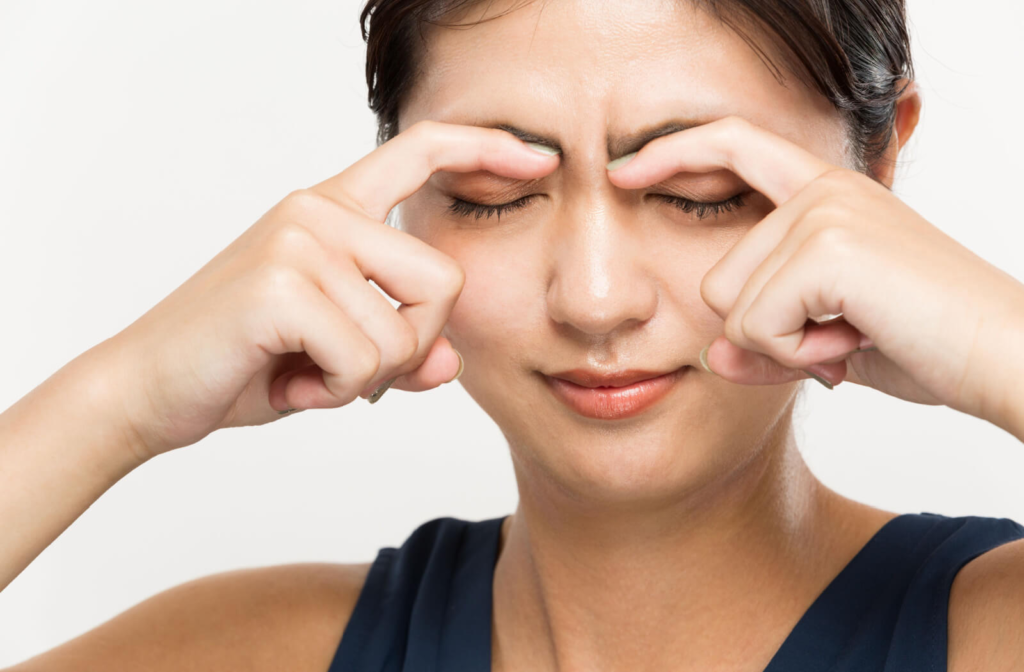If you’re like many other people, you’ve likely experienced eyelid twitching at some point. An eyelid twitch resolves on its own in most cases.
While the exact causes of eyelid twitching are unknown, some common factors that could be contributing include lack of sleep, stress, eye irritation, and excess caffeine intake, among others.
No one is immune to the occasional twitchy eye. A twitching eye isn’t typically something you need to worry about, but to rule out other possibilities, you should still see your optometrist for a comprehensive eye exam if the symptoms are persistent.
Suppose the eyelid twitching doesn’t resolve on its own or is accompanied by symptoms such as a drooping eyelid, swelling, or the twitch affecting more than just an eyelid. In that case, your eye doctor can assess your eyes and recommend a treatment.
What Is Eyelid Twitching?
So what is eyelid twitching? The short answer: it depends on what type of twitching you’re experiencing.
Eyelid Myokymia
Eyelid myokymia is one of the most common types of eyelid twitching. The condition often affects the lower eyelid more so than the top. It can last anywhere from several seconds, to a few hours, and even a few weeks. Usually, however, it resolves on its own without treatment.
Occasionally, eyelid myokymia can become chronic. In these situations, it may come and go relatively frequently.
Benign Essential Blepharospasm (BEB)
Benign essential blepharospasm (BEB), while a little bit more complicated than eyelid myokymia, isn’t dangerous. BEB is a form of dystonia that causes muscle contractions, leading to twitching or repetitive movements.
In some cases, treatments for BEB include Botox, medication, or surgery. BEB can affect men and women alike, but it is more common in middle-aged and older females. It’s important to note that this is a rare condition. Unless you have symptoms such as involuntary eye closure or your eye staying closed, it’s far more likely you’re affected by eyelid myokymia.
What Causes Eyelid Twitching?
There isn’t a one-size answer to what causes eyelid myokymia. What causes it to happen in one person may not in another, and vice-versa. Some common things associated with an increased risk of or aggravation of eyelid twitching can include:
- Caffeine, alcohol, and tobacco
- Lack of sleep
- Stress
- Eye irritation, such as a corneal abrasion
- Eye strain
- Environmental factors
- Strenuous physical activity
- Dry eye
- Side effects from medication
- Pink eye (conjunctivitis)
- Blepharitis
- Migraines
- Uveitis

Treating Eyelid Twitching
As you can see, there are a significant amount of things that can cause your eye to twitch. At Family Focus Eyecare, we often start by tackling the most common causes: lack of sleep, too much caffeine, and stress. Beyond that, we begin to look for deeper, more insidious causes.
If you’re dealing with annoying eyelid twitching, there are a few things you can try before making an appointment with your eye doctor:
- Get more sleep. The CDC recommends most adults get 7-plus hours per night.
- Decrease your caffeine intake. You don’t have to drop it completely, but try and keep it to 4 to 5 cups daily.
- Lowering your stress levels: exercise, meditation, and controlled breathing can all help to lower stress.
- Treat a potential underlying cause: dry eye, pink eye, blepharitis, or even uveitis.
- Reduce your screen time or take steps to prevent or minimize eye strain. If you’re dealing with strained eyes, your vision may be under or over-corrected. In this situation, visiting your eye doctor for a comprehensive eye exam is recommended.
When to See Your Eye Doctor
Eyelid twitching will rarely be a cause for concern. You should, however, make an appointment with your optometrist if you’ve been experiencing persistent twitching beyond 1-2 weeks. Your eye doctor will likely ask lifestyle questions and examine your eyes for noticeable signs of damage or disease that could be causing your twitching eyelid.
Other than persistent twitching, a few different reasons that you should seek out your eye doctor could include:
- Your eye becomes red, swells, or there is an unusual discharge.
- Your eyelid closes completely every time it twitches—sometimes, it may even stay closed involuntarily.
- More than just your eyelid is affected. Your face scrunches up when your eyelid twitches, for example.
- Your upper eyelid becomes droopy.
Discuss Your Concerns About Eyelid Twitching with Your Optometrist
There isn’t usually much to worry about if you notice some eyelid twitching. It is essentially normal. However, if you’ve tried some of the tips we discussed and you’re still experiencing eyelid twitching or if the twitching is getting worse, reach out to us at Family Focus Eyecare, and we will get to the bottom of your lid-twitching issue.



